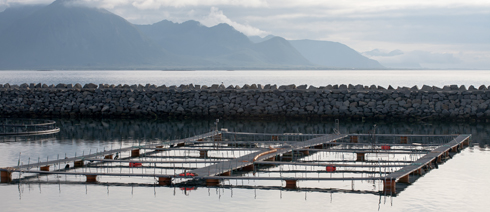The Complicated Industry May Be Incompatible with Organic Principles
[This article was previously published in the spring issue of The Cultivator, Cornucopia’s quarterly newsletter.]
by Kestrel Burcham, JD
Director of Domestic Policy at The Cornucopia Institute
Consumers often note that they do not see fish with the USDA organic seal at their grocery store or fishmonger. It is a topic that has come up many times within the National Organic Program (NOP) and its advisory board, the National Organic Standards Board (NOSB).
In 2003, Congress amended the Organic Foods Production Act (OFPA) to allow wild-caught fish to be certified organic as long as regulations were developed first. However, despite this change, regulators decided that wild fish should not be labeled organic because hunting wild animals is not “agriculture.”
In 2005, the NOP created an Aquaculture Working Group (AWG), which generated a report to inform the NOSB on the issues. The NOSB’s Livestock Committee then developed standards for farmed fish and other aquatic species, releasing several recommendations between 2007 and 2009.
 |
than for produce or livestock. Source: Adobestock |
However, there are questions as to whether a proposed organic rule on fish farming, also called aquaculture, is even viable. Both wild catch and most fish farming are associated with environmental problems that may make them incompatible with fundamental organic tenets.
Aquaculture comes with a host of environmental issues. A common method of farming fish, especially salmon, is to raise them in open nets in the ocean.
Due to crowding and nutrient (i.e., manure) overload, these pens often cause pollution that devastates nearby waters.
Farmed fish also carry more parasites and diseases, and fish that escape from these systems threaten to weaken or disrupt fragile wild populations.
Another concern is that wild fish are often harvested as feed for aquaculture operations, especially for salmon farms. This wild harvest contributes to the problem of overfishing, a serious concern due to its impacts on ocean ecosystems.
While management practices and technology could potentially mitigate some of these problems in the future, the industry is not there yet.
Furthermore, these issues only scratch the surface as to why no organic standards for fish have been proposed yet. It is far more difficult to create comprehensive standards for aquaculture than for produce and livestock.
Fish that are herbivores may require different standards than carnivorous fish, as will bottom feeders and bivalves (i.e., oysters, scallops, and other shellfish).
As it stands, the NOSB’s aquaculture recommendations cover topics including fish feed, net pens, and related issues. But fish farms also use medications and other materials not allowed in organic production.
Alternative methods or practices would need to be developed to farm fish, even if organic rules were developed to allow the practice.
At the request of the NOP, the AWG started submitting petitions for materials that could be approved in organic aquaculture in preparation for future standards.
However, as of October 2014, all aquaculture materials are currently tabled with the intention to re-evaluate them as soon as a proposed rule for organic aquaculture becomes available. The comments submitted into the public record regarding organic aquaculture show overwhelming agreement in two areas.
First, most commenters oppose organic certification of open-ocean pen facilities—many believe the environmental risks and incompatibility issues cannot be overcome.
Second, most commenters oppose the use of wild-caught fishmeal and oils in organic aquaculture feed.
Consumers may see fish labeled “organic” at some point in the future, but developing organic aquaculture standards does not seem to be a priority for the USDA.
This is not surprising, given the negative feedback from the public and the possibly insurmountable challenge of developing organic aquaculture standards.
In the meantime, interested consumers can use the Monterey Bay Aquarium’s Seafood Watch Guide to identify which seafood is high-quality and environmentally sustainable.

